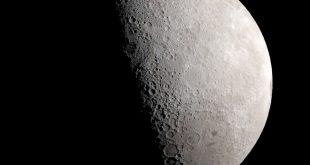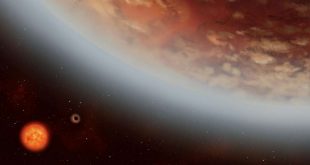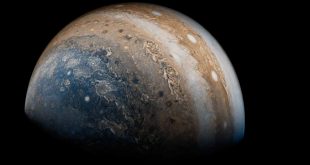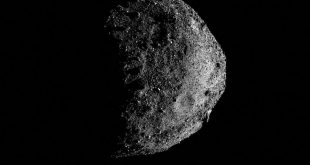Meteorites that crashed into Earth billions of years contain sugars, researchers say, lending support to the idea that asteroids may hold some of the ingredients to live. An international team of scientists found “bio-essential” sugars in meteorites, which also contain other biologically important compounds, according to a press release from …
Read More »Friday 13th to bring very rare, glowing ‘micro’ full moon.
A rare full moon, known as a “micro moon” will coincide with another rare event this week: Friday 13th. Our satellite will be at the furthest point in its orbit around the Earth. As a result, the moon will appear both smaller and dimmer in the night sky when viewed …
Read More »First ‘habitable’ world with WATER in atmosphere found using Hubble.
A group of astronomers may have found Earth’s long-lost cousin, discovering the first-ever “habitable” terrestrial planet with water in its atmosphere, according to new research aided by the Hubble telescope. Known as K2-18 b, the mysterious exoplanet is twice the size of Earth with eight times its mass, but its …
Read More »Moon can’t bear watching Earth do this to itself.
Gazing down with a vaguely orange tint at a new fire blossoming on the Earth where a fire should not be, the Moon confided that it felt sad and powerless watching the Earth destroy itself. “At first it was small things. Losing a species here or there. Just careless, really. …
Read More »Meteor Explosion on Jupiter captured in rare footage.
A stargazer landed the shot of a lifetime on Wednesday after he captured extremely rare footage of a mysterious flash of light on Jupiter, which may have been an elusive meteor explosion. Texas astrophotographer Ethan Chappel captured the incredible sight while he was filming the planet, and said the event …
Read More »Drone helicopter to fly on Saturn’s moon, Titan.
Nasa will fly a drone helicopter mission to cost $1bn (£800m) on Saturn’s moon, Titan, in the 2030s. The rotorcraft will visit dozens of promising locations on Titan to investigate the chemistry that could lead to life. Titan plays host to many of the chemical processes that could have sparked …
Read More »Nasa | Jupiter is so big and bright in the night sky that it is visible with the naked eye.
The planet is currently at its closest to Earth, meaning that it can be spotted in the sky without any special equipment. And while it looks beautiful enough already looked at with the naked eye, peering through binoculars or a small telescope could offer a detailed look at the planet. …
Read More »Scientists test radical ways to fix Earth’s climate.
Scientists in Cambridge plan to set up a research center to develop new ways to repair the Earth’s climate. It will investigate radical approaches such as refreezing the Earth’s poles and removing CO2 from the atmosphere. The center is being created because of fears that current approaches will not on …
Read More »NASA to pretend asteroid is about to smash into Earth.
Nasa is going to pretend a deadly asteroid is on its way, to practice for a real one. The “tabletop exercise” will allow the space agency and the other government organizations that will be tasked with responding to such an event to simulate their response, ahead of the possibility of …
Read More »NASA Captures First PHOTOS of ‘Apocalypse Asteroid’ Bennu That Can Strike Earth.
NASA’s the Origins, Spectral Interpretation, Resource Identification, Security-Regolith Explorer (OSIRIS-REx) spacecraft has recently entered the orbit around the asteroid Bennu, which is now 70 million miles (110 million kilometers) from Earth. NASA has captured an image of the 500-meter wide asteroid Bennu using its high tech Osiris-Rex spacecraft, according to …
Read More » Alghadeer TV Alghadeer TV
Alghadeer TV Alghadeer TV









